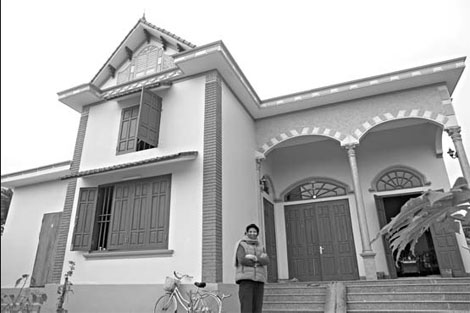Marriage gifts alter Vietnam
Updated: 2012-03-25 07:44
By Norimitsu Onishi (The New York Times)
|
|||||||||||
|
A South Korean son-in-law means hope for prosperity. South Korean husbands of two of Nguyen Thi Nguyet's daughters paid for this house. Chau Doan |
QUANG YEN, Vietnam - In the end, Bui Van Vui lived only three months in the new house that two of his daughters, married to men in South Korea, had helped him build here. Dying of throat cancer, he had exhorted the anxious contractor to hurry.
The massive two-story house dwarfed the squat concrete structure next to it, the family's old home. The new home's elegant red-tiled roof could be seen from afar in this rural corner of coastal northern Vietnam near Haiphong.
"This house was his dream," Mr. Bui's widow, Nguyen Thi Nguyet, 60, said recently.
The couple, like many others in the Vietnamese countryside, had prospered in recent years, thanks to daughters who, driven by dreams of better lives for themselves and Confucian filial piety for their parents, had emigrated to marry South Korean men. The money they and others earned in South Korea, wired regularly to small towns in Vietnam, often manifested itself in new homes.
The young Vietnamese women typically married older South Korean men who, because of their low incomes or previous marriages, had difficulty finding a Korean bride. South Korea's fiercely competitive marriage marketplace gave birth to a booming industry of marriage brokers who took these men on tours of Vietnam, where they chose wives in hastily arranged meetings.
It was during such a tour in 2007 that Mr. Bui and Ms. Nguyen's daughter, Bui Thi Thuy, then 22, met her husband, Kim Tae-goo, a widowed apple farmer in his mid-50s. At the Lucky Star karaoke bar in Hanoi, none of the two dozen women there initially expressed interest in Mr. Kim. But Ms. Thuy and two others stepped forward after Mr. Kim promised to send $100 a month to the parents of the woman who would marry him.
Ms. Thuy and Mr. Kim settled in a rural town in South Korea and had a daughter, but they separated a year ago. Ms. Thuy now lives in Seoul with a younger sister who also married a South Korean man.
At Ms. Thuy and Mr. Kim's wedding in Hanoi in 2007, Mr. Bui could not conceal his disappointment that his daughter was marrying a man his own age. Mr. Kim reminded him of the $100 he would send each month.
"He didn't keep his promise," Ms. Nguyen said of her son-in-law. In four years of marriage, he sent a total of $880, she said, adding, "He's poor." Mr. Kim declined to be interviewed for this article.
By contrast, Ms. Nguyen said, she received more than $100 a month from her younger daughter and her Korean husband. She sent part of her earnings from a part-time job in addition to the money from her husband.
The couple provided half of the $20,000 needed to build the new house here, Ms. Nguyen said.
With their daughters in South Korea, the family began thinking of building a new house.
In early 2010, Mr. Bui learned he had throat cancer, and he sought treatment in Hanoi. After it proved ineffective, he focused all his energy on finishing the house, and the house was completed in October 2010. In the last three months of his life, Mr. Bui grew so weak that he could no longer walk up to the second floor. The tumor in his throat swelled to the size of a grapefruit, leaving him unable to talk to his family, including Ms. Thuy, who had flown in from South Korea.
Shortly after her father's funeral, Ms. Thuy returned to South Korea. But her parents had kept a small plot of land for her.
"After her child grows up," the mother said, "maybe Thuy can come back to live here."
The New York Times
Today's Top News
Rescuers race against time for quake victims
Telecom workers restore links
Coal mine blast kills 18 in Jilin
Intl scholarship puts China on the map
More bird flu patients discharged
Gold loses sheen, but still a safe bet
US 'turns blind eye to human rights'
Telecom workers restore links
Hot Topics
Lunar probe , China growth forecasts, Emission rules get tougher, China seen through 'colored lens', International board,
Editor's Picks

|

|

|

|

|

|






